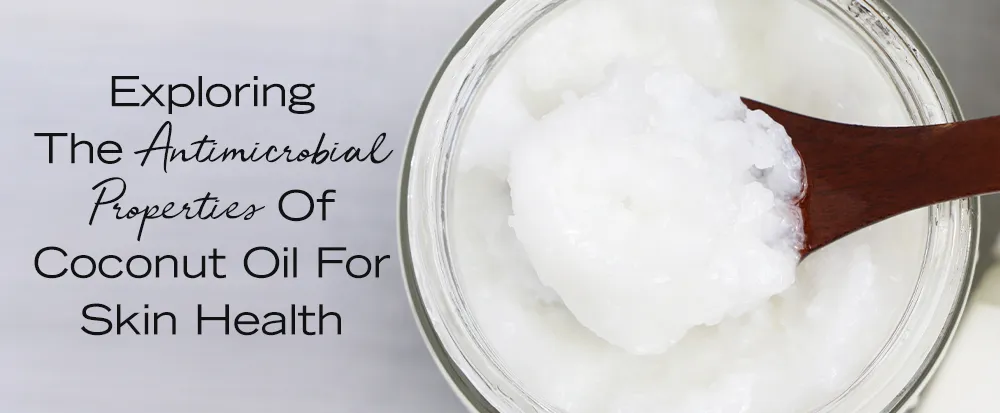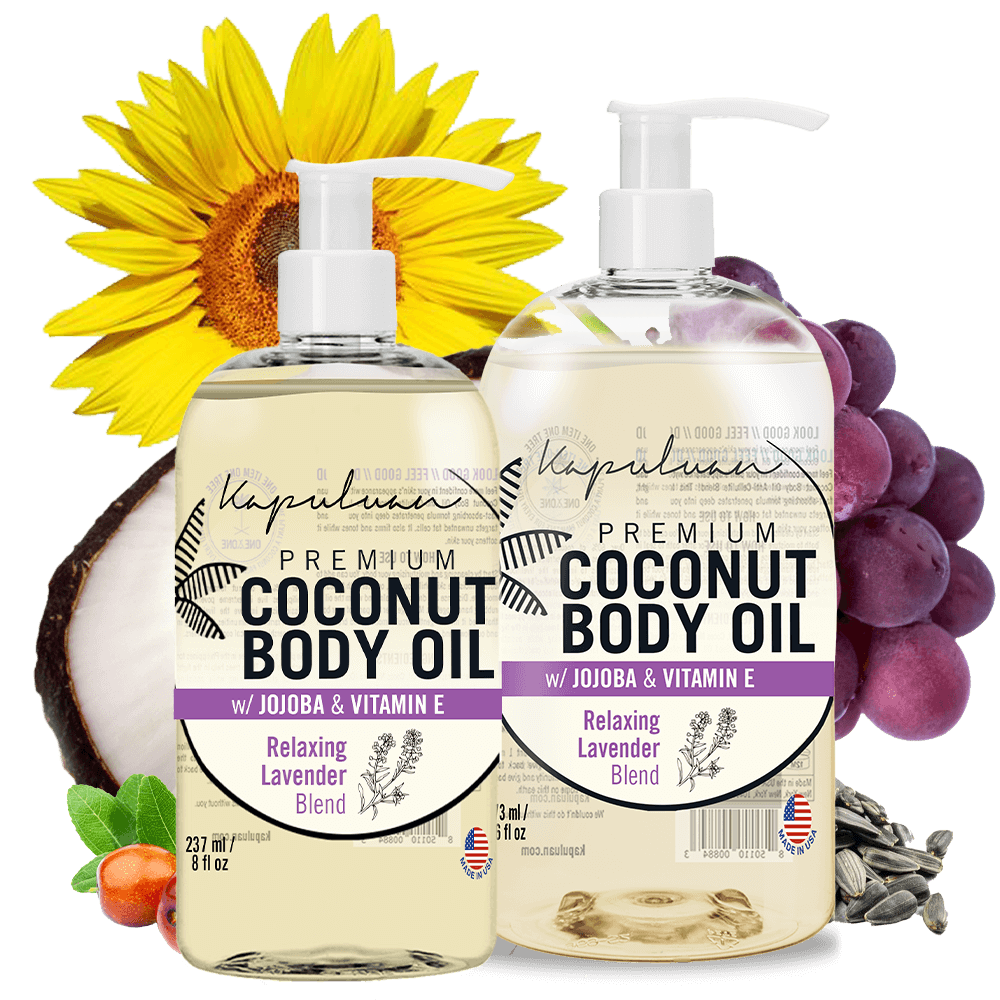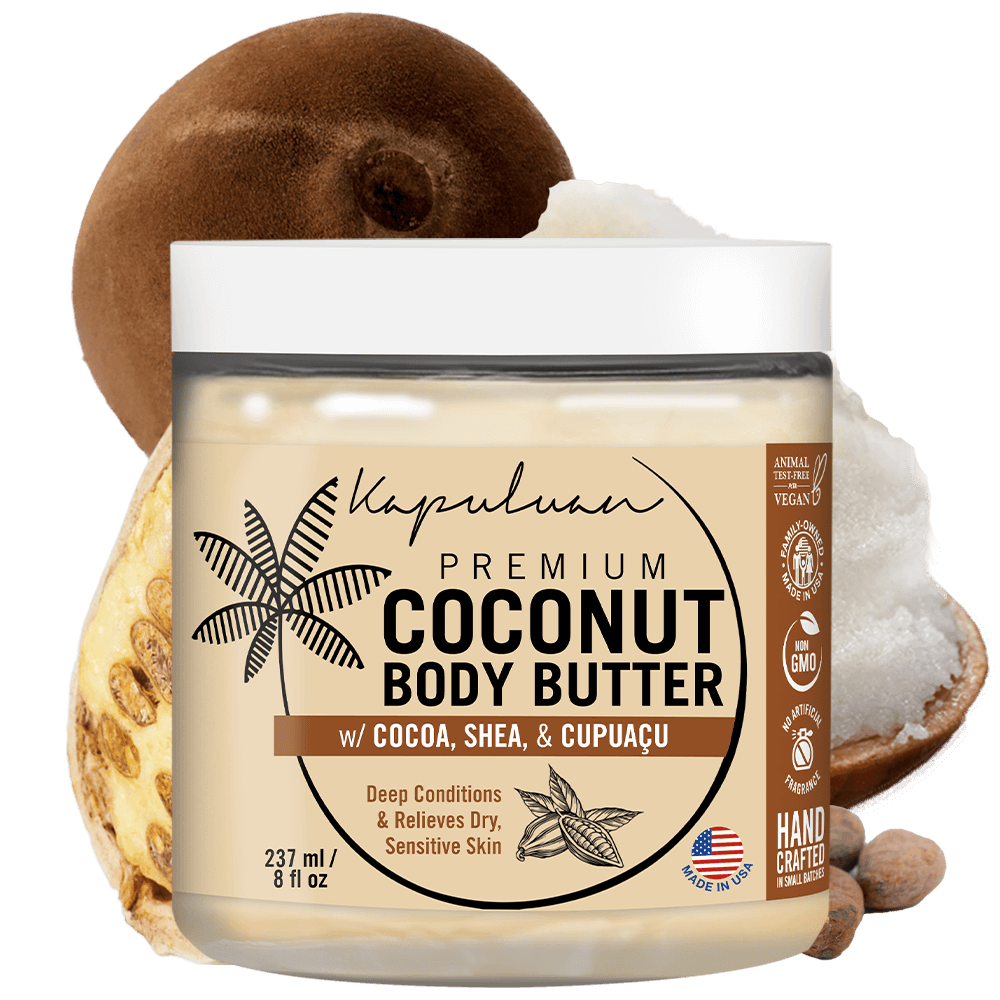Last Updated on October 19, 2024 by adeela

Isn’t it amazing how some of the most potent solutions to our everyday problems can be found in nature? Take coconut oil, for example. It’s a versatile product we’ve come to love and appreciate in our kitchens and as an essential component of our skincare routine. We’re particularly captivated by its antimicrobial properties, which have shown remarkable results in promoting skin health. And who wouldn’t want clear, radiant skin – free from the constraints of unwanted blemishes and infections?
In this piece, we’ll delve into coconut oil, exploring its rich composition and focusing on how its antimicrobial properties can benefit your skin’s health. We’ll discuss lauric acid – a key component of coconut oil known for its powerful bacteria-fighting abilities – and explain how this natural wonder protects your skin from harmful microbes. From bacterial infections to fungal conditions, even acne treatment, we’ll uncover all these areas where coconut oil shines bright. But don’t worry about safety or potential side effects – we’ve got you covered too! So please sit back, relax, and let us guide you through incorporating this magical ingredient into your skincare regime for healthier-looking and feeling skin that breathes freedom!
Understanding the Composition of Coconut Oil
Like a complex symphony composed of various instrumental notes, coconut oil is a blend of different fatty acids, each playing its unique role in providing antimicrobial benefits. The main components of this powerhouse are lauric acid, capric acid, and caprylic acid – all medium-chain fatty acids known for their powerful antibacterial and antifungal properties. Extracted primarily using cold pressing or wet milling, the oil’s quality, texture, and medicinal benefits can vary greatly depending on the extraction process employed. We’re always excited to delve deeper into how these extraction methods influence the composition of coconut oil. Cold pressing involves extracting oil from fresh, mature coconuts without applying heat. This method preserves more nutrients compared to other techniques but yields less oil. On the other hand, wet milling involves drying out coconut meat before extracting the oil. Though it yields more product, some argue it may compromise nutritional content due to exposure to high temperatures during drying. Now let’s consider its culinary uses; it’s no secret we adore using coconut oil in our dishes! Its light yet distinct flavor enhances food while offering us impressive health perks. From sautéing veggies to baking goodies or even adding a spoonful to our morning coffee for an energy boost, we incorporate this versatile ingredient into our daily routine in countless ways. Not only does it whip up delectable meals, but it also bestows upon us its extraordinary skin health benefits with every bite we take – truly an embodiment of beauty inside out!The Role of Lauric Acid
Lauric acid, a major component of this tropical treasure, steals the spotlight with its powerful protective qualities. Nearly half of the fatty acids in coconut oil come from lauric acid, making it one of the richest natural sources available. This medium-chain triglyceride (MCT) is also found in breast milk and other natural products but nowhere in such abundance as in our beloved coconut oil. Lauric Acid sources are plentiful, but none quite match the potency found within this versatile nut. When we delve deeper into the benefits of lauric acid for skin health, we find it has an impressive influence on our body’s digestive processes. When consumed or applied topically, our bodies convert lauric acid into monolaurin, a compound known to have potent antimicrobial effects. It effectively combats harmful bacteria and viruses, which can lead to skin infections and inflammation – no small feat for anyone dealing with acne-prone or sensitive skin. What makes this even more remarkable is how gentle yet effective it is for all skin types. Whether battling dryness or trying to achieve balance with oily skin, incorporating coconut oil into your routine can yield noticeable improvements. Its hydrating properties soothe dry patches, while its antibacterial nature helps regulate sebum production for those struggling with excess shine. And let’s not forget about its potential anti-aging benefits! The antioxidants in coconut oil work tirelessly to prevent damage from free radicals – granting us that much-desired freedom from premature aging signs like wrinkles and fine lines. So next time you reach for your jar of coconut oil, remember it’s not just an ordinary moisturizer; it’s a powerhouse packed full of incredible skincare benefits thanks to lauric acid!Mechanism of Antimicrobial Action
Dive headfirst into the world of lauric acid’s protective powers, and you’ll find yourself in a battleground where harmful bacteria are systematically disarmed. This happens within the realm of our skin, an ecosystem that is constantly under attack from external factors like germs and pollutants. The antimicrobial properties of coconut oil largely hinge on its high concentration of lauric acid, which works by dissolving the outermost layer of bacterial cells, effectively killing them off. It’s a fascinating process that promotes healthier skin and strengthens it against future attacks.- Lauric acid targets and eliminates harmful bacteria
- Coconut oil enhances overall skin health
- Regular use can help fortify your skin against future damage
The Impact on Bacterial Skin Infections
Imagine the relief you’d feel, knowing that a nasty bacterial skin infection could be effectively tackled with something as natural and accessible as lauric acid. Lauric acid is one of the primary fatty acids found in coconut oil, and numerous scientific studies have proven its potent antimicrobial properties. That’s right – this humble tropical fruit is quietly waging war against harmful bacteria, helping to prevent infections before they take hold. With approximately 50% of coconut oil composed of lauric acid, it’s no wonder we see such significant results in infection prevention when applied topically. Now let’s delve deeper into the oil efficacy. When coconut oil is applied to the skin, it forms a protective barrier that locks in moisture and blocks potential bacterial threats. And guess what? It doesn’t stop there. As lauric acid breaks down on your skin surface, it morphs into monolaurin – a compound that is even more effective at killing bacteria than its parent molecule! This means you’re getting double the defense against harmful microorganisms that can wreak havoc on your skin health. What’s truly impressive about coconut oil’s antimicrobial properties isn’t just its potency and versatility. Whether fighting off common culprits like Staphylococcus aureus or reducing symptoms associated with more stubborn conditions such as acne or eczema – coconut oil has shown promising results, so next time you reach for an over-the-counter cream or antibiotic ointment, consider this: Nature has gifted us with an extraordinary solution for our skin woes wrapped up neatly in a hard-shelled fruit named Coconut!Effects on Fungal Skin Conditions
You might be surprised to learn that nearly 20% of the world’s population battles with some fungal skin condition, and this is where the tropical magic truly shines. With its astonishing antimicrobial properties, coconut oil provides an all-natural alternative to harsh chemicals often used to treat these conditions. It’s a potent ally in our fight against fungal resistance development – a significant concern as many fungi are becoming resistant to commonly used antifungal medications.- Athlete’s Foot: This pesky problem thrives in warm, moist environments like your workout shoes. However, applying coconut oil can help keep this condition at bay due to its antifungal properties.
- Ringworm: Despite its name, this common skin infection is not caused by a worm but rather a fungus that creates circular rings on the skin. Consistent application of coconut oil can help soothe itching and speed up recovery.
- Dermatitis Management: Fungi also cause certain types of dermatitis – a skin inflammation leading to itching and flaking. Coconut oil fights off the offending fungi and moisturizes and heals inflamed skin.
Potential Benefits for Acne Treatment
Let’s shift gears now and talk about something many of us have experienced at one point or another – acne, and how nature’s wonder can potentially come to our rescue. We refer to the humble coconut oil, a tropical treasure that may be the key to easing your skin woes. Coconut oil, with its rich content of fatty acids like lauric acid and capric acid, is known for its natural antimicrobial properties that can help combat harmful bacteria on the skin. These qualities could reduce acne severity by eliminating acne-causing bacteria from your face. Now let’s delve deeper into this connection between coconut oil and acne treatment. Besides its antibacterial qualities, coconut oil has anti-inflammatory properties that can soothe redness and swelling associated with severe acne outbreaks. Not only does it help fight against unwanted invaders on your skin surface, but it nourishes the deeper layers of your epidermis with essential nutrients promoting healthier skin cells. Furthermore, coconut oil is believed to play a role in hormonal balance impact, crucial in maintaining clear skin since hormonal fluctuations often trigger breakouts. But wait! There’s more to this story than applying oil on pimples! We must use this natural remedy effectively, considering everyone’s unique skin type and sensitivities. For instance, while some people might find direct application helpful in reducing their pimple count, others might benefit more from incorporating it into their diet for systemic effects or using products enriched with coconut oil as part of their skincare regimen. So yes, while there isn’t a magic bullet solution for all kinds of acne conditions, adding a touch of nature, such as coconut oil, into our daily routine might be another small step towards gaining freedom from those pesky zits!Safety and Side Effects
Before diving headfirst into the coconut oil treatment, being aware of potential side effects and safety measures is critical. While coconut oil has many health benefits, particularly for skin health, its use is not without caution. Allergic reactions are a primary concern when using any new product on your skin, even for natural substances like coconut oil. There have been instances where individuals with sensitive skin or allergenic predisposition have experienced irritation or rash after applying the oil.- Conducting a patch test before fully incorporating it into your skincare routine is important.
- Always ensure you buy pure and organic coconut oil – Oil Purity is key.
- If an allergic reaction occurs, discontinue use immediately.




